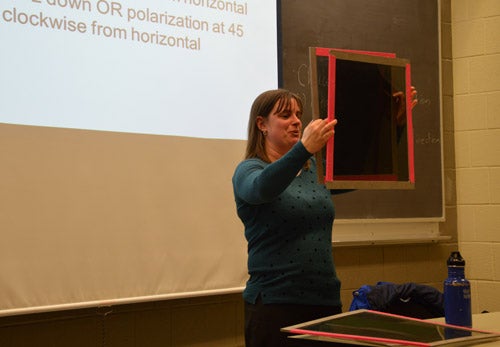Learning to speak quantum like Prime Minister Trudeau
Waterloo launches Quantum Mechanics for Everyone - a course for students who want to know what’s behind the next tech revolution
Waterloo launches Quantum Mechanics for Everyone - a course for students who want to know what’s behind the next tech revolution
By Wendy Philpott Faculty of ArtsWhat does it mean to say a quantum system is in superposition? And more important: Why should we care?
The reality is - from highly secure communications to ultra-sensitive devices and super-powerful computers - quantum mechanics will change the way we live, work and play. And while Prime Minister Justin Trudeau grabbed media attention recently when he delivered a one-minute quantum lecture, many of us don’t have even a basic understanding of the science that’s driving this technological revolution.
So a University of Waterloo professor has launched a course - Quantum Mechanics for Everyone - to help students across campus improve their understanding of quantum even if they haven’t taken a science course since high school.
“Here at Waterloo we have front row seats in the quantum revolution,” says Doreen Fraser, a philosophy professor. “It’s important for our students to be empowered to participate in public policy debates about developments in science and technology.”
One of the world’s leading institutes for quantum information research - The Institute for Quantum Computing (IQC) - is based at the University of Waterloo. But not everyone on campus is a quantum scientist. Fraser designed the course for any Waterloo student who wants to go beyond the 60-second sound bite that Trudeau offered and become conversant in both the science and the social implications of harnessing the power of quantum mechanics.

Doreen Fraser, University of Waterloo philosophy professor, teaches Quantum Mechanics for Everyone
Fundamentals of quantum mechanics that everyone can learn about in the new course include:
In Quantum Mechanics for Everyone, Fraser extends the scientific teaching by combining practical experiments and online simulations with historical and philosophical perspectives.
She says to understand the basics of quantum-anything – from theory to computing - the principles of classical physics are important for context. Then, the leap to quantum includes key historical moments in the development and understanding, and misunderstanding, of what was first quantum theory. These include Einstein’s struggle with the idea that separated particles can influence each other, which he famously described as “spooky action at a distance.”
The world’s leading physicists have disagreed about what the quantum world is like, explains Fraser, yet they have accepted the practical implications of the theory. Today, quantum mechanics is regarded as a highly potent tool for information processing, communication, and cryptology.
Students in Quantum Mechanics for Everyone experience practical simulations and demonstrations. One in-class demo helps them understand the strategy for distribution of an encoded key, a critical part of quantum cryptography. Using prototypes known as Alice and Bob, Fraser showed how quantum mechanics can be used to detect and block eavesdropping which can enable unprecedented levels of data security.
“I think it’s great that the Prime Minister knows basic information about quantum mechanics and how it is leading to new technology – and that he took advantage of the opportunity to offer a brief explanation to the public,” said Fraser, who specializes in philosophy of science. “This is not a subject that only needs to be understood by quantum physicists and can be ignored by everyone else.”
With a seed grant from Waterloo’s Centre for Teaching Excellence, Fraser developed learning resources including videos and online simulations of experiments that go beyond Google hits, but are still accessible for non-specialists who want to engage in accurate and meaningful discussions on technological advances that affect us all.
That level of critical engagement is the goal of scientific and technology literacy (STL) at Waterloo. Quantum Mechanics for Everyone joins a multidisciplinary range of scientific and technology literacy (STL) courses for all students.
Designed to teach basic scientific and technological understanding, these courses also ask students to examine responsible innovation, distinguish reliable from unreliable science reportage, and consider the relationships between governments, scientists and the public.

Read more
Waterloo Philosophy Professor Heather Douglas has been named a Fellow of the American Association for the Advancement of Science (AAAS)

Read more
Meet the 14 exceptional students representing Waterloo’s newest grads

Read more
More than 100,000 children and youth from across the region are discovering the wonders of science and technology through the University of Waterloo
The University of Waterloo acknowledges that much of our work takes place on the traditional territory of the Neutral, Anishinaabeg, and Haudenosaunee peoples. Our main campus is situated on the Haldimand Tract, the land granted to the Six Nations that includes six miles on each side of the Grand River. Our active work toward reconciliation takes place across our campuses through research, learning, teaching, and community building, and is co-ordinated within the Office of Indigenous Relations.